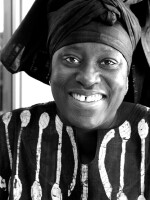After the killing of dozens of pro-democracy demonstrators by security forces in Guinea last week, West African leaders have sent a presidential mediator in a bid to calm the tensions. France, the former colonial power, has called for international intervention.
Just over one week ago, 50,000 opposition civilians gathered at the main stadium in Guinea's shabby seaside capital, Conakry, to protest against rumored plans by the military leader, Capt. Moussa Dadis Camara, to run for president. When he swept to power after a coup in December, Camara pledged to hold elections but said he would not be a candidate.
Without apparent provocation, presidential guard troops opened fire on the peaceful crowd in the stadium.
Guinean human-rights groups say 157 people were killed, more than 1,200 were wounded and many women were raped. The government says 57 people were killed. Still wearing a bandage on his head, Sidya Toure, a former Guinean prime minister and prominent opposition leader, said the violence had shaken the nation.
"The main part of the population is afraid by what they saw on 28 Sept. in the stadium," Toure said. "They saw soldiers killing people. They really tried to kill us, you know. It was something very violent."
An older woman — who did not want her identity revealed — was among a number who were publicly raped during the violence.
"All I know is that I was raped," she said, "but I can't explain why. I can't explain why."
Thierno Maadjou Sow of the Guinean Organization of Human Rights described the situation as heinous. He said what is most shocking is that the rapes by armed men happened in public, in broad daylight.
In Paris, Foreign Minister Bernard Kouchner called for international intervention in Guinea, which was a French colony until 1958.
Kouchner described the violence as savage and said Paris could no longer work with Camara. Some Guinean opposition politicians have suggested a peace force to protect the people. Camara dismissed Kouchner's comments, saying they are an affront to African dignity and that Guinea is a sovereign nation and not a part of France or any other foreign country.
Camara seized power in December, hours after the death of longtime military ruler Gen. Lansana Conte. Under Conte, both development and democracy were stunted as the diamonds, gold and huge reserves of bauxite, used to make aluminum, were looted by a ruling elite. Some hoped this impoverished nation of 10 million was entering a new era of prosperity and good governance.
On Friday, distressed family members were among the thousands who gathered at the main mosque in Conakry for prayers, desperate to identify their loved ones among rows of dead bodies. Pandemonium erupted, and security forces fired tear gas.
The president of Burkina Faso, Blaise Compaore, himself a former army captain, arrived in Guinea on Monday with the tough task of trying to mediate a resolution to the crisis. Appointed by the Economic Community of West African states, Compaore said he hoped to help restore peace and stability to Guinea.
Copyright 2022 NPR. To see more, visit https://www.npr.org. 9(MDAzMjM2NDYzMDEyMzc1Njk5NjAxNzY3OQ001))






